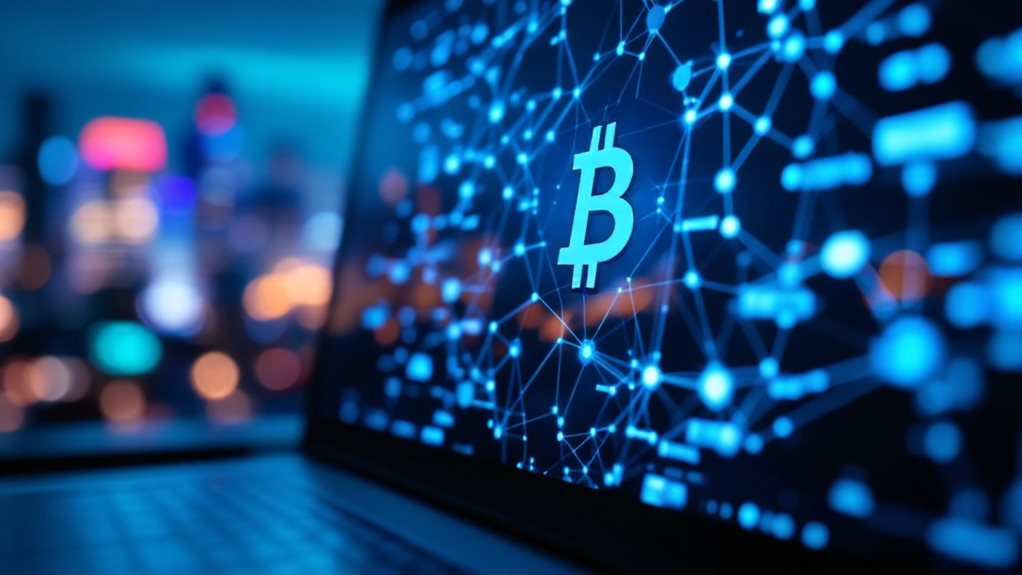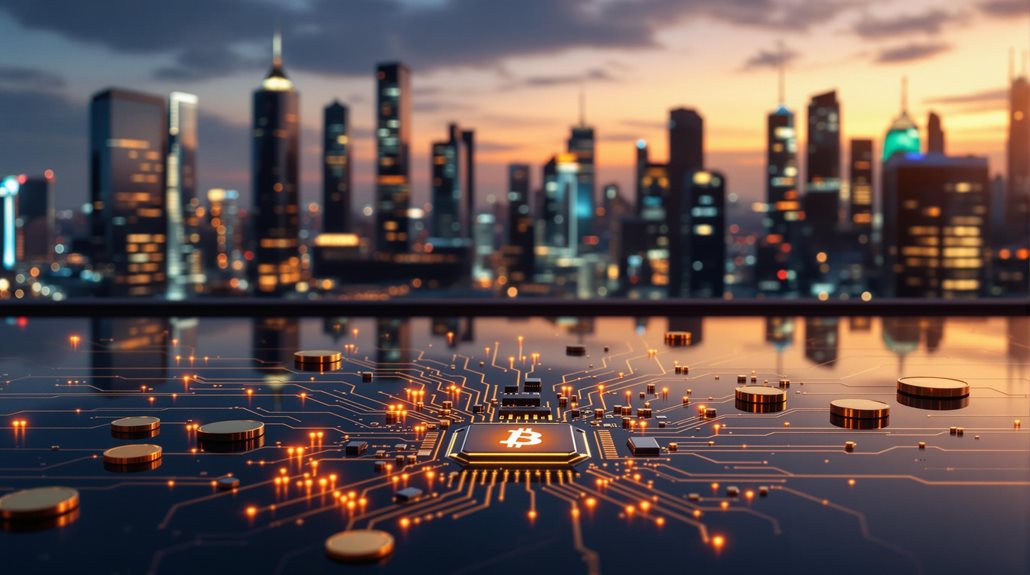Bitcoin Cash is a cryptocurrency that split from Bitcoin in 2017 to solve transaction speed and cost issues. It processes about 100 transactions per second using larger data blocks than Bitcoin, making transfers faster and cheaper. Like Bitcoin, it has a maximum supply of 21 million coins and uses similar security measures. Recent updates in 2023 added smart contract capabilities, making Bitcoin Cash more versatile for everyday digital payments. There's much more to discover about this evolving cryptocurrency.

While Bitcoin remains the most well-known cryptocurrency, Bitcoin Cash emerged in 2017 as a separate digital currency created from Bitcoin's code. It came about through what's called a "hard fork," which means it split from Bitcoin to become its own unique cryptocurrency. The main reason for its creation was to solve some of Bitcoin's problems, especially when it came to handling lots of transactions quickly and cheaply. Financial promotions are now supervised by Bitstamp UK Limited for this cryptocurrency.
Bitcoin Cash works differently from its parent currency in several important ways. It can process about 100 transactions every second, which is much faster than Bitcoin. It also uses larger blocks in its blockchain – 32 megabytes compared to Bitcoin's smaller blocks. Think of blocks like containers that hold transaction information; bigger containers mean more transactions can be processed at once. The split officially occurred at block 478558 of the Bitcoin blockchain. Bitcoin's transaction fees had risen dramatically, reaching over $54 by December 2017.
One of the biggest advantages of Bitcoin Cash is its low cost. Users typically pay less than a penny per transaction, making it much cheaper to use than Bitcoin. It's designed to work more like everyday digital cash, rather than as a store of value like Bitcoin. The system doesn't use something called SegWit (Segregated Witness), and it removed the "Replace by fee" feature that Bitcoin uses. The decentralized network eliminates the need for intermediaries, further reducing transaction costs.
Despite their differences, Bitcoin Cash shares some important characteristics with Bitcoin. Both have a maximum supply cap of 21 million coins, and they use the same type of mining algorithm called SHA-256. However, Bitcoin Cash has less mining power behind it, which some people say makes its verification process less secure than Bitcoin's.
In May 2023, Bitcoin Cash took a big step forward by introducing CashTokens, which allow for smart contracts and decentralized applications (dApps) to run on its network. This update made the currency more versatile and opened up new possibilities for how it can be used.
The technology behind Bitcoin Cash relies on blockchain, just like other cryptocurrencies. It uses a proof-of-work system where miners verify transactions and add them to the blockchain. The main goal of Bitcoin Cash is to serve as a peer-to-peer electronic cash system that's fast and practical for everyday transactions, from buying coffee to sending money across borders.
While it might not be as famous as Bitcoin, it's carved out its own space in the cryptocurrency world by focusing on being a useful, efficient payment system.
Frequently Asked Questions
How Secure Is Bitcoin Cash Compared to Traditional Banking Systems?
Bitcoin Cash's security comes from its decentralized network and encryption, making it very hard to hack or tamper with transactions.
While traditional banks face risks like fraud and cyberthreats, they offer customer service and insurance protection that BCH doesn't have.
BCH provides more privacy since it doesn't collect personal data, but users have to be careful with their private keys since there's no way to recover lost funds.
What Fees Do You Pay When Trading Bitcoin Cash?
Bitcoin Cash fees are remarkably low, typically ranging from half a penny to three cents per transaction. The exact fee depends on network traffic and transaction size.
During busy times, fees might increase slightly, but they're still much lower than Bitcoin's fees. Users can choose different fee options: "Fast" for 30-minute confirmation, "Fastest" for 20-minute confirmation, or "Eco" for cheaper, slower processing.
Some wallet apps let users set custom fees.
Can Bitcoin Cash Be Mined Using Regular Home Computers?
While it's technically possible to mine Bitcoin Cash on a regular home computer, it's not practical.
Today's BCH mining needs specialized equipment called ASIC miners. Regular computer CPUs and GPUs can't compete with these powerful machines. The network's high difficulty level means home computers would use lots of electricity but likely won't earn any rewards.
Most successful miners use dedicated ASIC hardware that costs thousands of dollars.
Which Countries Have Banned or Restricted Bitcoin Cash Transactions?
Since Bitcoin Cash is a cryptocurrency like Bitcoin, it faces similar restrictions worldwide.
Countries with complete crypto bans, including China, Algeria, Bolivia, Egypt, and Nepal, don't allow Bitcoin Cash transactions.
Places like Bangladesh, Indonesia, and Vietnam have partial restrictions.
Other nations like India, Turkey, and Russia limit crypto through banking rules.
However, many countries haven't specifically banned Bitcoin Cash but regulate it along with other cryptocurrencies.
How Do Bitcoin Cash Transaction Speeds Compare to Regular Credit Cards?
Credit cards are considerably faster than Bitcoin Cash for processing transactions.
While Bitcoin Cash can handle about 116 transactions per second and takes 2-10 minutes to confirm, Visa's network can process up to 65,000 transactions per second with near-instant approval.
Credit card payments are usually completed in just a few seconds.
Though Bitcoin Cash is faster than regular Bitcoin, it's still much slower than traditional credit card networks.





